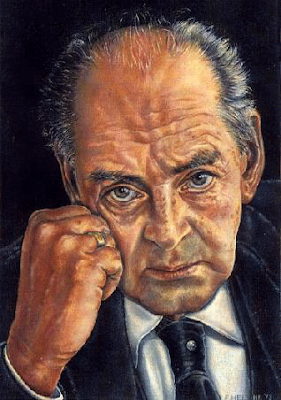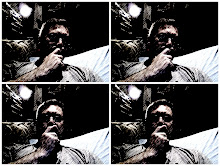Having spent the last week recovery from Thoracic Spinal Surgery, my mood is dark and strained by pain. Pain piles onto new Pain and just when I think the worst pain is gone it comes back with a fury that leaves me shaken to my core. As I complete one back surgery and another one is being scheduled, my surgery informs me that I'll need at least a third surgery. It seems that pain is my new mode of existence. As Shelley wrote:

Ah me! alas, pain, pain ever, for ever!
No change, no pause, no hope! Yet I endure.
I ask the Earth, have not the mountains felt?
I ask yon Heaven, the all-beholding Sun,
Has it not seen? The Sea, in storm or calm,
Heaven's ever-changing Shadow, spread below,
Have its deaf waves not heard my agony?
Ah me! alas, pain, pain ever, for ever!*
I read these words for the first time, a first year college student, when I had no idea what pain was. It also makes me rethink the Biblical declaration & the Church declarations that Christ is eternally crucified. This idea of a promethean or christological pain at least carries with it a note of a redemptive purpose... my pain is neither redemptive or benevolent - it just is, without reason, purpose or meaning. It is the cruelty of an indifferent universe. (besides the point that any theory that glories anyone's suffering, let alone their endless suffering is just a cruel theory of religion..... Don't they ever get the willies singing "on a hill far away, stood an old rugged cross, the emblem of suffering and shame..." that's just really sick.
In Shelley, it is different... he thinks that suffering gives rise to and urgency for humans to aspire to the highest values of human existence - freedom, truth, justice, love, etc... He believed that suffering was a human phenomenon & that the only response to suffering was endurance (though not submission), rebellion, speaking the truth to power & overcoming yourself through love.
Nietzsche said that art is the only justifiable theodicy (explanation or rationalization of the co-existence of God & evil or suffering). I read poetry - some about suffering - some about life - some just embodying the beauty / the virtue of the language... does it provide a justifiable theodicy - does experiencing the beauty of human creation (born from suffering) prove to be so meaningful and significant that it excuses suffering - does it justify meaningless pain?
Now I have aged and experienced more of the world - I think that the popularized Christianity is fundamental mistaken, Shelley is naive, Nietzsche is close, but doesn't grasp the limits of art. I don't think that there can be a 'justifiable' theodicy - it could never cover the whole of suffering with redemptive significant... it is a nihilistic theodicy - it is the only thing that provides a plausible glimpse at meaning, however indeterminate & fluid. Believe me, the old platitudes about suffering are all wrong... it doesn't build character.. make you a better person... teach you empathy... connect you to all who suffer (Tolstoy's opening to Anna Karenina is on point here - All unhappy families are unhappy in their own unique way... so all who suffer do so in their own troubled way.)... it does nothing but rob one of the power to live..... it doesn't teach new wisdom... it just hollows you out like a tree infested with termites... thus the nihilism of it.

The logical outcoming of this theory would have us like Alice (as in Alice in Wonderland) falling through the rabbit hole that seems to never end and finding some jam on shelves constructed on the walls of the hole along the way down ---- she enjoys the jam and forgets that she is falling endlessly.... that is my Lewis Carroll philosophy of life - we are falling endlessly & hopelessly and we have not idea where we will land or what we become of us when we land - will we still exist? will we be severely harmed? what if we never land? But along the way, amidst our grave concerns we stop some jam and bread & we help ourselves to enjoy the bounty of the fall (since we must fall after all, why not for something to enjoy). And so we do, we find much to enjoy and take pleasure in... for me poetry, art, conversation (ugh - I mean GOOD conversation), fine food and wine, a beer or two, etc... All of our pleasures are merely JAM that we enjoy as we FALL.

Finally, maybe it is like Anna Karenina by great Tolstoy.... in the amazing final section... beautiful in its details and not attempting a mass theory or definition of what all humans experience. One person, Anna, this makes sense. Life has robbed Anna of love, family, her children, her husband, her new lover, her name & position, her self-respect, and worse of all her fondest hopes had been cruelly played with and destroyed with guile. She stands on the dock of the train station, she steps closer to the edge of the platform as she hears the train approach.
As people all around converse about their travel plans and financial matters, they too in mass move closer as the train approaches. Then, in what she felt to be a moment of clarity, Anna let her torso weigh her down - leaning forward more and more with the ease of fainting into bed and fell onto the tracks as the train approached. However, as soon as she hit the tracks on the ground she awoke from this fantasy of oblivion and with every thought and action began to move toward the platform top again. But as her hands reached out to those who had rushed to the edge to see what had happened, the train still decelerating put an end to her last hope and crushed more than her last desire for life. Life is like that. (See clip below)
*
Prometheus Unbound, by Percy Bysshe Shelley
Prometheus' opening monologue.




























































